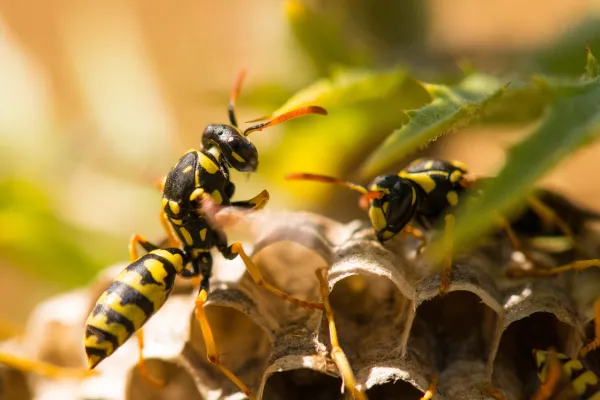
BLOGS
BLOG

Why Wasps Are Aggressive in Spring (and What to Do)
There’s something about a warm spring day that makes you want to kick back on the patio with a cold drink—or maybe get started on that gardening project you've been putting off. But just when you settle into spring’s good vibes, here they come: wasps. Buzzing around like they own the place. And if they’re acting extra bold this time of year, there’s a good reason for it.
Wasps are more than just a nuisance—they can be aggressive, especially in spring. So if you’ve been noticing more of them flying around your yard or even trying to build nests in your house, you’re not imagining things.
Let’s break down why wasps act the way they do this time of year—and what you can do to take back your space (without getting stung). We’ll also show you how Valley Wide Pest Control can help keep these winged warriors far from your family.
Why Are Wasps So Active in Spring?
Believe it or not, most wasps don’t make it through the winter. Only the queens survive, hunkering down in protected spots like attics, sheds, woodpiles, or under eaves. When spring hits and temperatures rise, the queen wakes up hungry and ready to do one thing: build a new colony.
Spring = Nesting Season
In early spring, queen wasps are hunting for the perfect place to build their nests. They’ll fly around scouting locations—under roof eaves, inside grills, garden sheds, porch ceilings, and sometimes inside wall cavities. Once they pick a spot, they start building a small paper-like nest using chewed wood and saliva. Charming, right?
From there, she starts laying eggs, which quickly hatch into worker wasps. And this is where things ramp up fast. Within a few weeks, there’s an entire crew of workers out gathering food and expanding the nest.
This makes spring the best time to stop a wasp problem—before the colony gets out of control.
Why Are Wasps Aggressive in Spring?
1. Territorial Behavior
Early in the season, the queen is protective of her nest site. She’s basically setting up shop and doesn’t want any competition or threats. If you get too close, you may be seen as a danger—even if you’re just trimming a hedge or opening your shed.
2. Foraging and Nest-Building Stress
Building a nest is a lot of work. Queen wasps (and early worker wasps) are constantly on the move gathering food and materials. All that activity can make them more agitated and quick to defend their territory.
3. Vibration Sensitivity
Believe it or not, wasps can react to vibrations—like a lawnmower, weed trimmer, or even banging on a wall near their nest. That’s one way to unintentionally provoke them.
What Do Wasp Nests Look Like?
Wasp nests are usually grayish and papery, about the size of a golf ball to a softball in early spring. They often appear in corners of eaves, under deck railings, behind shutters, or tucked inside outdoor furniture or grills.

If you spot a small nest early in the season, don’t ignore it—it can double or triple in size within weeks.
How to Keep Wasps Away This Spring
You can’t completely “wasp-proof” your yard, but you can make it a whole lot less inviting. Here’s how:
Seal Entry Points
Check for gaps or cracks around vents, siding, rooflines, and attic openings. Use caulk or mesh to block potential nest spots.
Remove Old Nests
While wasps don’t reuse old nests, seeing one can signal to others that the area is safe. Remove any visible nests from last year before queens start building new ones.
Keep Food and Drinks Covered
Wasps are drawn to protein in early spring and switch to sweets later on. Don’t leave pet food, soda cans, or grill scraps lying around.
Take Out the Trash
Keep garbage bins sealed tightly. Even a bit of food waste can attract wasps looking for a quick meal.
Watch Your Landscaping
Avoid planting too many flowering bushes near doorways or patios. While beautiful, they’re magnets for wasps and bees alike.
What to Do If You Find a Nest
Small nest? Big problem.
Even a tiny wasp nest can hold dozens of wasps—and trying to remove it on your own can end badly. Wasps sting when they feel threatened, and unlike bees, they can sting more than once.
If you find a nest:
Don’t swat or spray it during the day—wasps are most active in sunlight.
Avoid disturbing the area—that includes slamming doors, mowing nearby, or using noisy tools.
Call a professional—especially if the nest is in a high or enclosed location.
That’s where Valley Wide Pest Control comes in.
How Valley Wide Pest Control Handles Wasps (So You Don’t Have To)
At Valley Wide Pest Control, we’ve helped hundreds of homeowners deal with wasps safely and effectively. We know how to handle these stinging pests—so you don’t have to risk getting hurt or making the problem worse.
Here’s what we offer:
Professional Wasp Inspections
We’ll check your home’s exterior, eaves, sheds, and other hotspots for early nest activity. If we find one, we act fast—because stopping a nest in spring is much easier than dealing with a full-blown summer swarm.
Safe Nest Removal
Our trained technicians use the right tools and safety gear to remove nests efficiently—whether they’re in plain sight or tucked away in a wall or attic.
Preventative Treatments
We apply targeted, family-safe treatments to keep wasps from rebuilding in the same areas. This includes repellent applications around eaves, vents, and common nesting zones.
Seasonal Wasp Control Plans
Want to stay ahead of the sting? We offer spring-to-fall plans that provide continuous protection throughout wasp season.
Final Thoughts
Wasps in spring are more than just a buzzkill—they’re actively expanding and defending their territory, and they’re not afraid to let you know it. The key is early action. Catching a wasp problem in spring is way easier (and safer) than dealing with a massive nest in July.
So before the buzzing gets out of hand, let Valley Wide Pest Control handle the sting for you. We’ll keep your home safe, your yard peaceful, and your springtime… wasp-free.
👉 Call Valley Wide Pest Control today for a no-obligation wasp inspection and enjoy spring the way it’s meant to be—without the buzz.
© 2024 Valley Wide Pest Control. All rights reserved.

